They spoke of his family’s military history and his rebellious youth, his bravery and the decency that bravery made possible. They cracked wise about his humor and his temper. And while the memorial services for Sen. John Sidney McCain III this week highlighted the biography of an American original, they also highlighted the deep divisions in this nation’s politics that, for the first time in four decades, lacks McCain’s impatient voice.
While President Donald Trump had been notably excluded from the program, it was clear many of the speakers — from both political parties — had him on their minds as they mourned McCain, a political giant who died after a brutal fight with brain cancer. In praising McCain’s uncanny ability to reject reflexively partisan posturing, many of the speakers during Saturday’s services at Washington’s National Cathedral perhaps began a longer period of mourning for the style of politics McCain sought to demonstrate and one that seems impossible in the era of Trump.
“In recent years, we (would) sometimes talk of that intense period like football players remembering a big game,” former President George W. Bush said. “In the process, rivalry melted away. In the end, I got to enjoy one of life’s great gifts: the friendship of John McCain. And I’ll miss him.”
Added another former president who went toe-to-toe with McCain but occasionally met privately with him to hear his counsel: “We never doubted the other man’s sincerity or the other man’s patriotism, or that when all was said and done, we were on the same team. We never doubted we were on the same team.” Those word were from former President Barack Obama, moments after Bush.
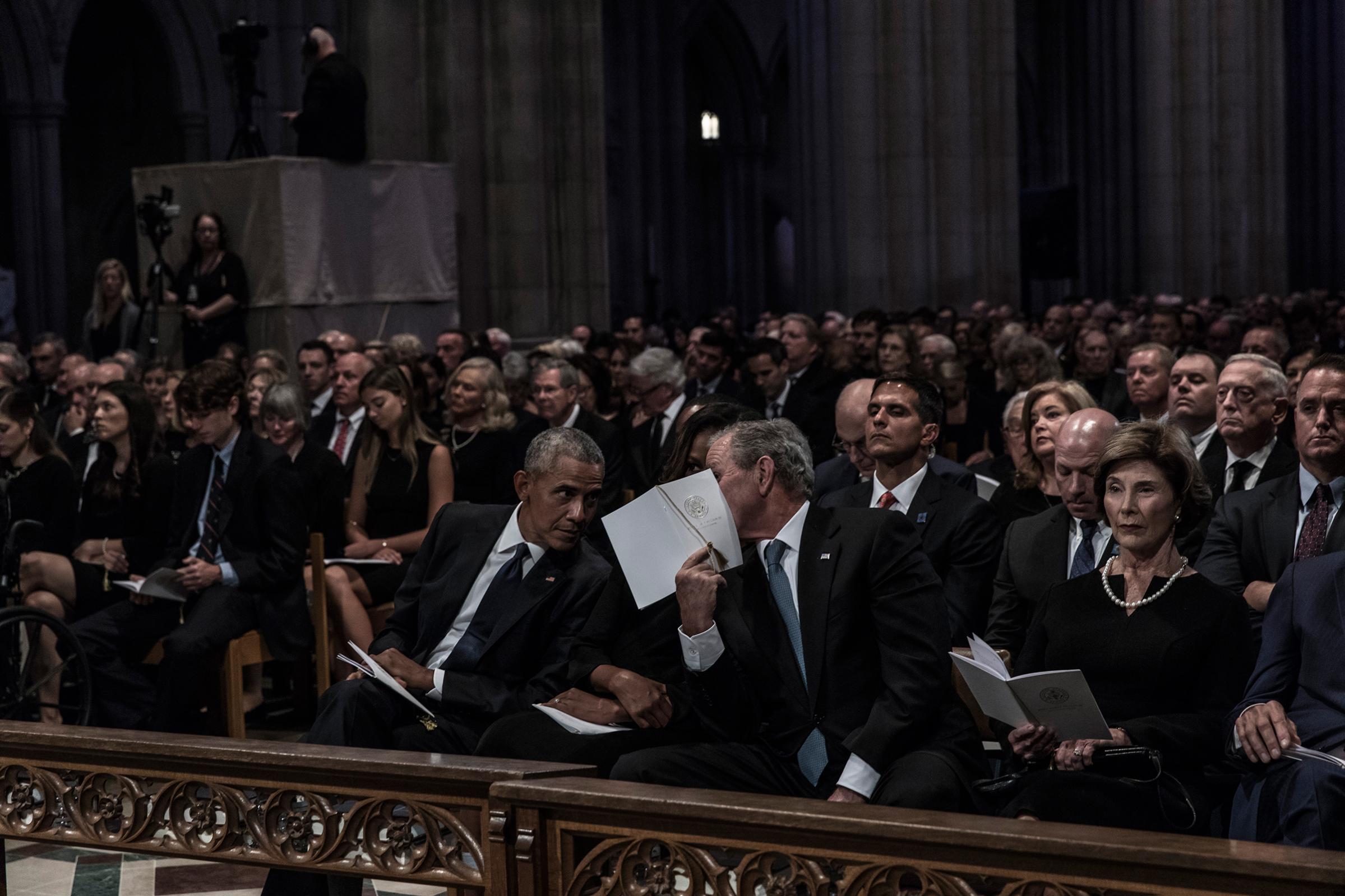
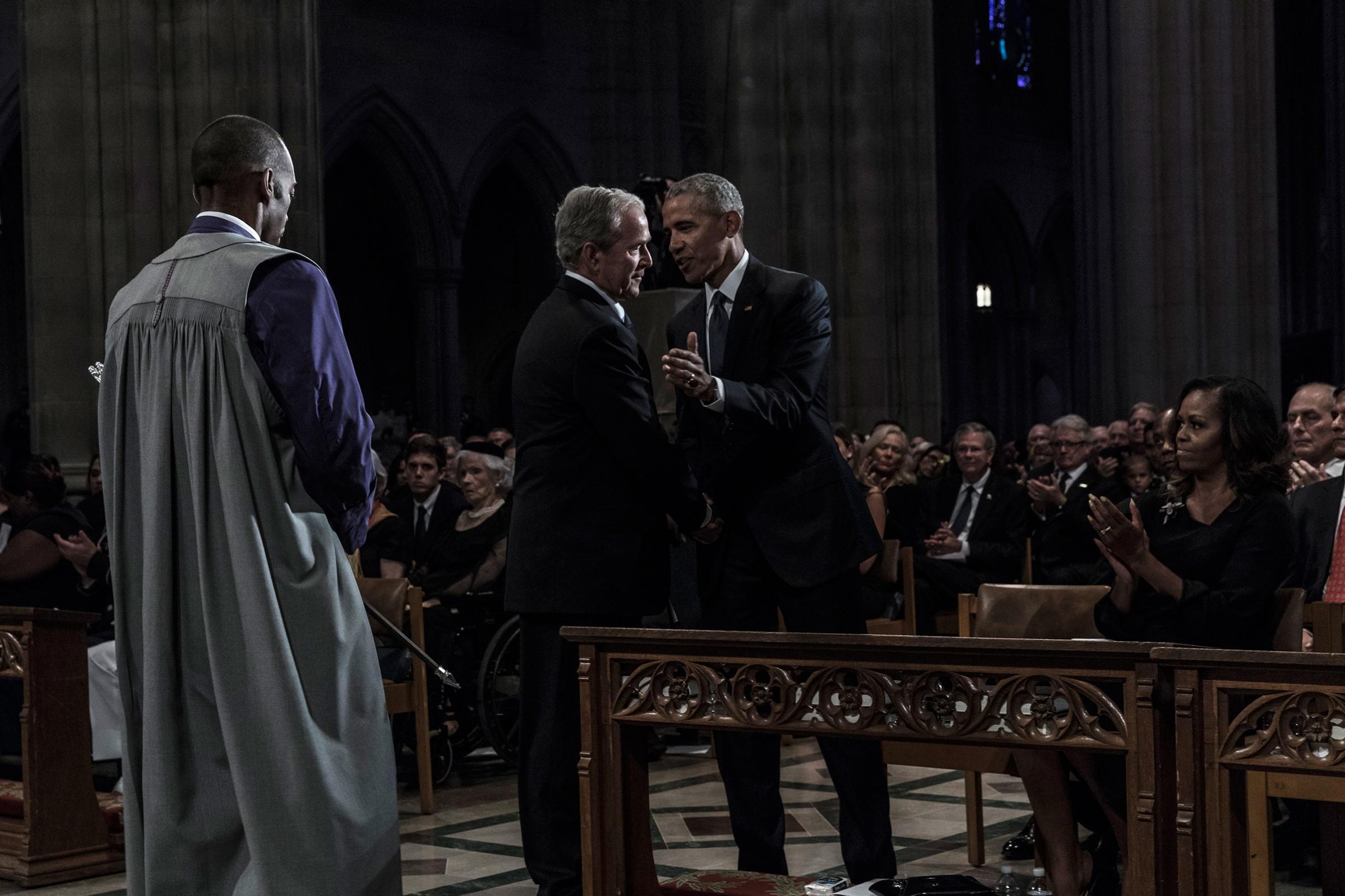
For this past week, America rightly mourned one of the few figures in public life whose celebrity and substance aligned. The son of American military royalty, he attended the Naval Academy, became fighter pilot and, in turn, Prisoner of War in Vietnam. He became a legislator, two-term presidential candidate and global statesman whose chief cause was against tyranny.
McCain could pivot from a Saturday Night Live sketch to a defense policy hearing effortlessly, and often with the same sly humor. He took the time to know not just foreign heads of state, but cultivated relationships with up-and-comers in foreign parliaments who would guide the next generation. Seldom could a reporter ask him a question that McCain hadn’t considered at length or wasn’t willing to discuss in hours of interviews in Capitol Hill hallways or aboard his campaign bus, branded brilliantly as the Straight Talk Express.
No one needed to say it, but everything McCain embodied fell in stark contrast with the White House’s current occupant, a man who literally pushed a Montenegrin Prime Minister aside so he could find his way to the head of the line, and, in his mind, head of the pecking order. As town cars delivered dignitaries to a packed, invitation-only funeral that spanned generations and crossed political boundaries, the President was at the White House tweeting attacks on the press, the courts and Canada.
So dissimilar were the approach to public service in McCain and Trump, intermediaries stepped in between the two men to make sure Trump knew it best he stay away from these sessions. After all, Trump mocked McCain’s years as a prisoner of war in the campaign and refused to back down, even after the Senator’s diagnosis of brain cancer was made public. A go-to line at his campaign rallies was mocking McCain’s vote against Obamacare’s repeal. “Senator Thumbs-Down,” went Trump’s sneer, even as McCain retreated to his Arizona ranch. After his death, the White House flags returned to the top of flagpoles until everyone around the President persuaded him to drop the pettiness.
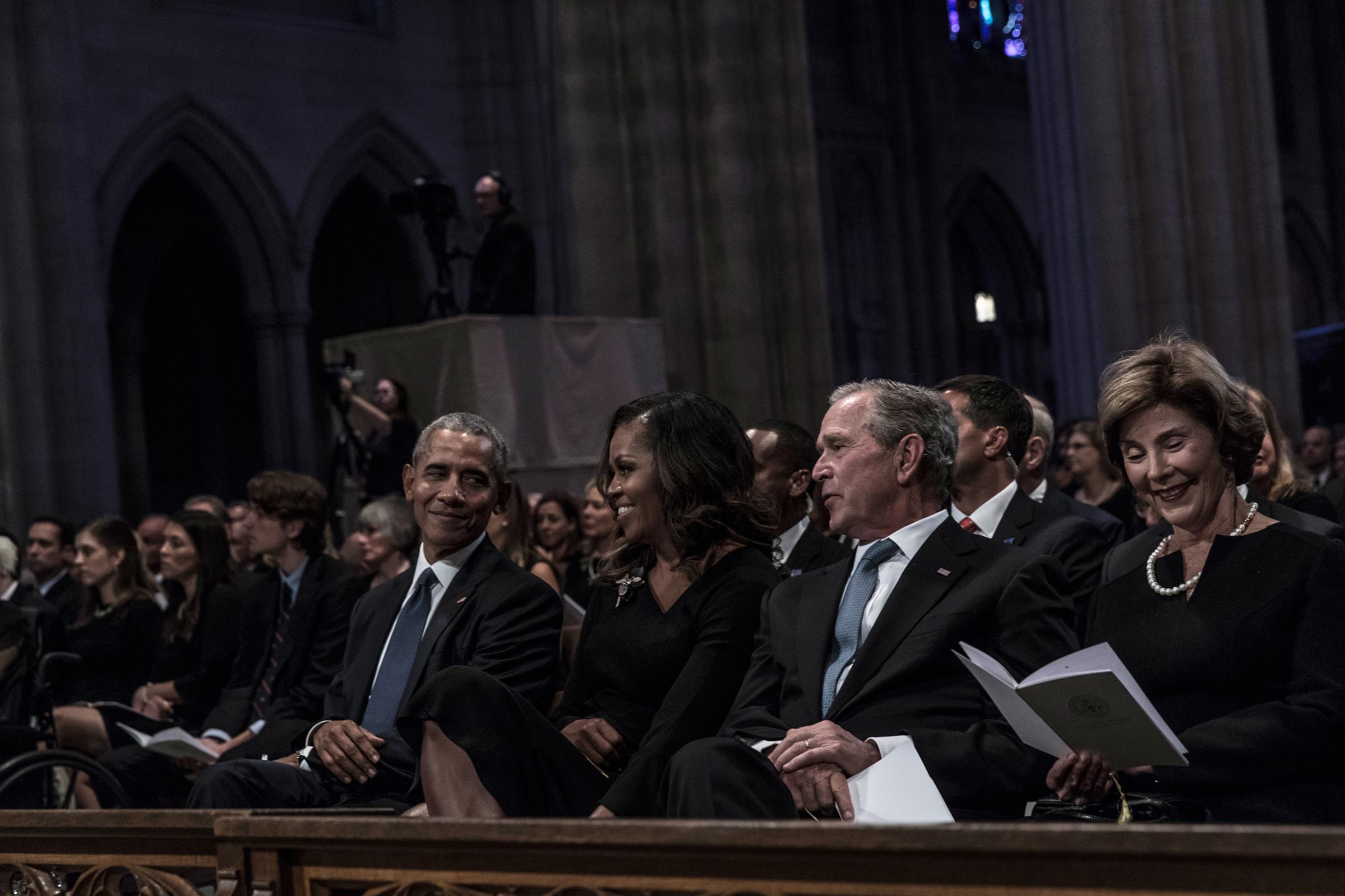
Trying to set the record straight one last time, longtime McCain friend and the man initially recruited to be his 2008 running mate, former Sen. Joe Lieberman, described the Obamacare vote as a rejection of “the mindless partisanship” that derailed Washington from functioning. It was an appeal to put policy over partisanship. At that very moment, Trump seemed to announce the end of trade negotiations with Canada and threatened Congress not to fight him.
The fight seemed incredibly one-sided in the moment, and the enthusiasm of the crowd cleared both parties.
When Meghan McCain, the journalist and host of ABC’s The View, stepped to the front of the chapel to deliver a tearful eulogy, she was ready with a pointed rejoinder to Trump’s taunts.
“My father is gone. … He was a great man. We gather here to mourn the passing of American greatness — the real thing, not cheap rhetoric from men who will never come near the sacrifices he gave so willingly, nor the opportunistic appropriation of those who live lives of comfort and privilege while he suffered and served. She continued, mocking Trump’s campaign sloganeering: “The America of John McCain had no need to be made great again because America was always great.”
A short time later, Trump left the White House wearing a white “Make America Great Again” hat and load into a 12-vehicle motorcade, bound for one of his golf courses.
Illustrating the great chasm between Trump and the fraternity of ex-Presidents, Obama suggested McCain would have been a better fit, especially given Trump’s hardline views on immigrants. “John understood as J.F.K. understood, as Ronald Reagan understood, that part of what makes our country great is that our membership is based not on our blood line, not on what we look like, what our last names are, not based on where our parents or grandparents came from or how recently they arrived, but on adherence to a common creed that all of us are created equal, endowed by our creator with certain inalienable rights,” Obama said.
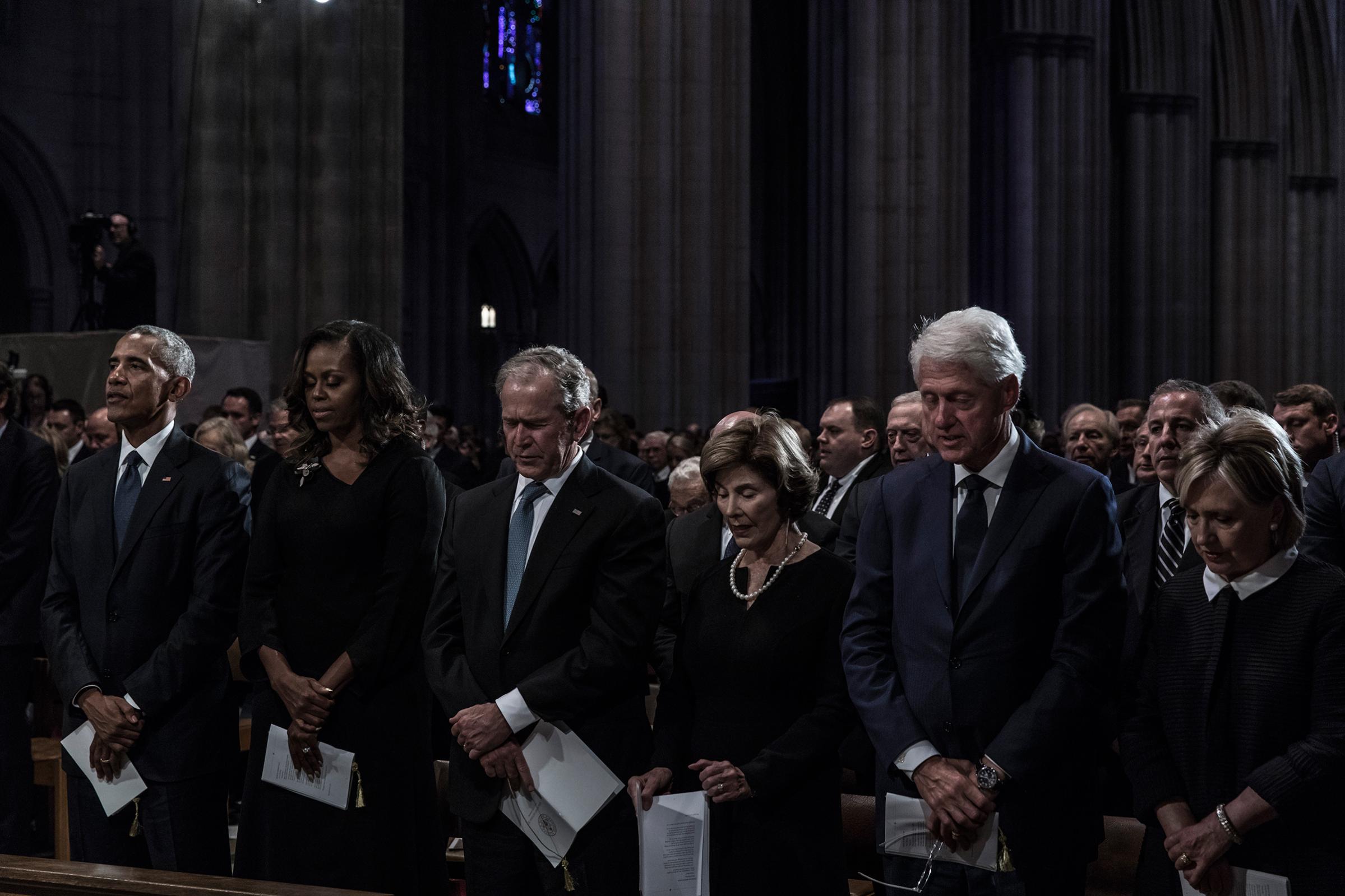
McCain’s former rivals’ concerted civility spoke to McCain’s approach to competitors. “His opponents were still patriots and human beings,” summarized Bush, who defeated McCain in the 2000 presidential primary but later turned to McCain to help sell an increase in troops for the unpopular war in Iraq.
Obama — and the Cathedral, too — laughed that McCain was sniggering about the scene he choreographed. “What better way to get a last laugh than make George and I say nice things about him to a national audience?” said Obama, who bested McCain in a general election in 2008.
These victors now were humble and effusive.
Contrast that to how Trump still snipes at his vanquished rival Hillary Clinton, or as he brands her “Crooked Hillary.” Clinton, a former First Lady, Senator and Secretary of State, sat in the front row of the church, perched between her husband, former President Bill Clinton, and former Vice President Dick Cheney.
It was impossible not to feel awkward for the Trump interlopers, who obviously had zero control over the President. As First Daughter and White House senior adviser Ivanka Trump arrived in the Cathedral on Saturday, along with husband and fellow senior adviser Jared Kushner, the President was at the White House tweeting out quotes from last night’s Fox News programs, accusing “Barrack Obama” of spying on the Trump campaign in “a police state.”
White House Chief of Staff John Kelly, Defense Secretary Jim Mattis and the U.S. Ambassador to Russia and early McCain ally, Jon Huntsman, sat in the third row, directly behind the Obamas. National Security Advisor John Bolton, Director of National Intelligence Dan Coats and Transportation Secretary Elaine Chao were also spotted among the mourners. It was clear that not everyone shared the Trump’s views of McCain.
The guest list also seemed reminiscent of a college homecoming. Former Sen. Mike DeWine of Ohio, a Republican, and the Senate’s No. 2 Democrat, Dick Durbin of Illinois, embraced each other near the south entrance. Former Democratic Congresswoman Jane Harman crossed the sanctuary to grab Lieberman, a Democrat who became an Independent, a clasp on the shoulder. Democratic Leaders Nancy Pelosi and Chuck Schumer, crossed the grand space to warmly greet Bush, whom they savaged during the 2006 midterms to reclaim a majority.
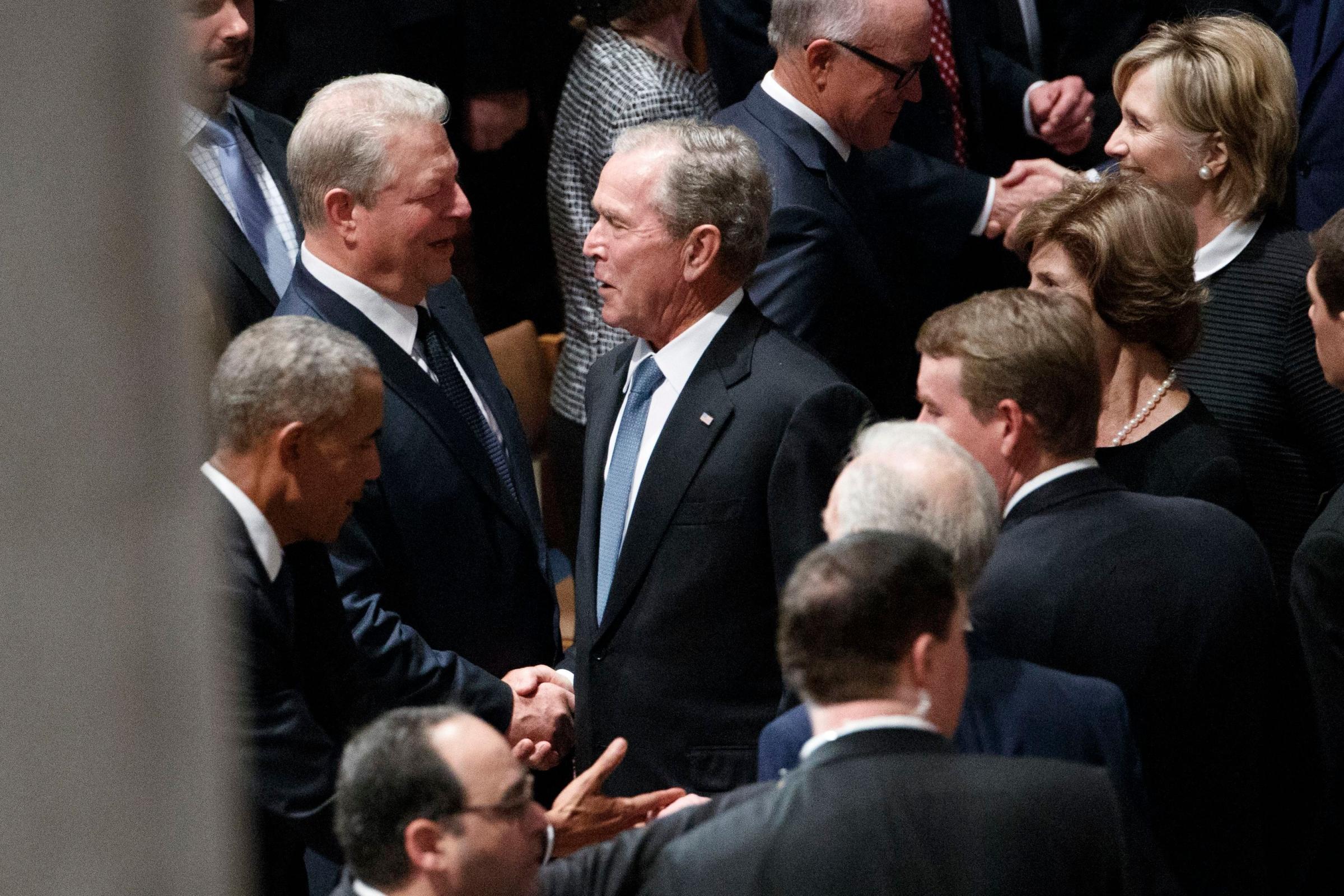
In what was likely McCain’s final moment of public service, he compelled Washington to reach across the aisle, at least for a humid Saturday morning. There’s little optimism they’ll hold that grip for long.
There was no shortage of laments about the loss of what McCain represented, the ideal he embodied. “Honor was John’s lodestar,” former Secretary of State Henry Kissinger said. “It was his way of life.”
But for all of the words written and spoken of him, there is no one standing by to take up his charge. For all of McCain pal Lindsey Graham’s objections to Trump’s antagonism toward McCain — it “pisses me off to no end,” the South Carolina Republican said this week — it will still be Graham hitting the golf course with the President before long. Even though Trump said horrible things about Sen. Ted Cruz and his father and his wife when they were running against each other, the President on Friday announced he was flying to Texas to campaign for Cruz — and Cruz said it was “terrific!” As much as these lawmakers applauded an inclusive United States, which of them will stand up to Trump on the almost 500 children who remain separated from their parents at the U.S.-Mexican border? It’s easy to praise McCain’s example when little is at stake, but it’s harder to follow when the risk is real. That’s why this week has been a mourning not just for the man, but for what we hoped to live up to.
“They look at him as if John came from another age, that he lived by a different code, an ancient, antiquated code — where honor, courage, character, integrity, duty were what mattered,” former Vice President Joe Biden said of McCain during a memorial service in Phoenix earlier this week. “Because that was obvious how John lived his life. But the truth is, John’s code was ageless. Is ageless.”
And elusive.
Even a lasting memorial for McCain is proving politically difficult in such a political environment. A proposal to rename the office building McCain for years called his Capitol Hill base is likely a non-starter. Southerners want to keep the name of a segregationist on the building. Republicans aren’t eager to publicly side with McCain, who still has pockets of antipathy in the conservative corners of the GOP. And some lawmakers simply won’t do it because they don’t trust Schumer. They praised McCain’s post-political stances, but there were largely crickets when it came time to actually put, to borrow McCain’s campaign slogan, “country first.”
Such lack of courage would have sparked McCain’s famous temper. He often unfurled it for reporters and policymakers he thought were being glib, lazy or mean. But he also demonstrated unflinching decency once his blood pressure leveled off. At the Capitol on Friday, McConnell made note of his own clashes with McCain. “I’ve long joked that his guards at the Hanoi Hilton probably needed group therapy after John was finished with them,” McConnell said to laughter. “Well, let’s just say there were times when some of his Senate colleagues were tempted to form a support group of our own.”
It took guts for McCain to constantly roil his own party when he thought they were wrong, to partner with Democrats when he thought them right. It won him foes from all sides and he relished the fight. What is unknown, though, is whether anyone has the stomach for the fight. American politics, at least at this moment, offers no incentive for such moxie.
That didn’t mean McCain didn’t try, even in passing, to inspire one last round of resistance via decency. “John’s voice will always come as a whisper over our shoulder: we are better than this, America is better than this,” Bush said.
It was perhaps overly optimistic, something the man who ran his campaign on “hope” acknowledged. In the span of less than a decade, Obama lamented, the gravity center of American politics changed. “So much of our politics, our public life, our public discourse can seem small and mean and petty. Trafficking and bombast and insult and phony controversies and manufactured outrage,” Obama said, in no small manner taking aim at his successor. ”It’s the politics that pretends to be brave and tough but in fact is born of fear.”
Fear, it seems, is always stronger than hope.
More Must-Reads from TIME
- Cybersecurity Experts Are Sounding the Alarm on DOGE
- Meet the 2025 Women of the Year
- The Harsh Truth About Disability Inclusion
- Why Do More Young Adults Have Cancer?
- Colman Domingo Leads With Radical Love
- How to Get Better at Doing Things Alone
- Michelle Zauner Stares Down the Darkness
Write to Philip Elliott at philip.elliott@time.com